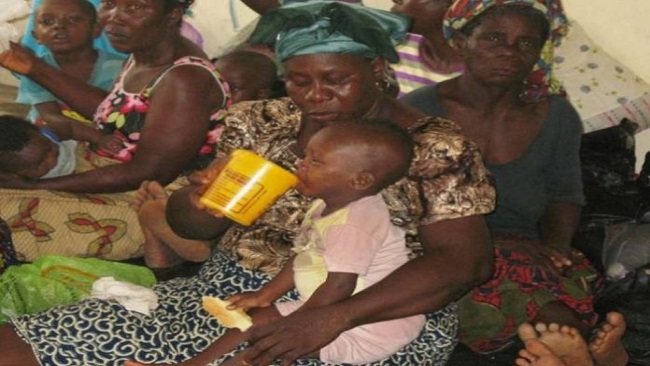Nigeria aids refugees fleeing from Southern Cameroons
More than 25,000 refugees have travelled across the border from Cameroon to Nigeria and dozens continue to arrive every week. Caritas Nigeria is appealing for urgent support to fight an emerging humanitarian crisis as a growing number of refugees have been forced to flee political upheaval and armed conflict in neighbouring Cameroon.
“The situation is dire,” said Fr Evaristus Bassey, director of Caritas Nigeria. “According to some of the refugees, they escaped on bush paths with only the clothes they were wearing.” Caritas Nigeria says assessments show more than 25,000 refugees have travelled across the border from Cameroon to Nigeria and dozens continue to arrive every week. Caritas has launched an international appeal to provide 10,000 refugees in Cross River State with food, clean water, mosquito nets and other aid.
Fr Bassey said the influx was having a serious impact on already impoverished Nigerian communities.“Many refugees are staying with relatives or friends they have known on the Nigerian side,” he said. “Typically many of these villages are rural and housing conditions are poor and congested. Some of these communities in peace time had no functional latrines except designated spots for open defecation. Water sources are from the stream.”
The armed insurgency in Cameroon is largely driven by the Ambazonian group which is demanding the full restoration of statehood for what was a former British colony in southern Cameroon from 1922 to 1961. Their objective is the dissolution of the 1961 Union of Southern Cameroon with French Cameroon.
English speaking parts of Cameroon have long complained of marginalization by the French-speaking dominated government, which has deteriorated into a brutal crackdown. Caritas Cameroon’s Fr Kisito Balla Onana said, “Our English-speaking brothers and sisters are in distress.
“Two weeks ago I went to the field with one of the bishops. We visited deserted villages where the houses were burned down. Many of their inhabitants had left and were living in extremely difficult conditions. Caritas brought them clothes, food and a small sum of money.”
Many refugees have fled their homes to Nigeria to escape the conflict which has destabilised the country and destroyed lives and livelihoods.
Caritas Nigeria says services are stretched and there is inadequate accommodation, food, water and sanitation available.“We want to urgently provide humanitarian relief to those in dire need, before this crisis becomes too monstrous and difficult to handle,” said Fr Bassey.
Caritas Nigeria conducted rapid assessments across some of the affected areas that have received a large influx of refugees from Cameroon. The assessment revealed that the Cameroonian refugees in Cross Rivers State were mostly based in the communities within Nigeria that are sharing borders with Cameroon.
Most refugees are living in host communities with relatives, in abandoned government quarters or uncompleted buildings and even open space. They have been dependent on the generosity of impoverished host communities for donations of food and clothing as most of them fled for their lives.
“Caritas Nigeria carried out an assessment two years ago on the Oban corridor in 18 communities because of an environmental program we wanted to initiate,” Fr Bassey said. “The clean water and hygiene conditions were appalling. These are aggravated now with the present crisis.”
While Caritas has carried out assessments in Cross River State where the refugees have the largest concentration, it is seeking input and guidance in other areas where refugees are being housed.
“Caritas has already made assessments in the Oban Corridor and the Boki and Ikom axis,” said Fr Bassey. “Caritas will soon carry out market surveys and establish relationships with vendors for food vouchers. The main challenge though is that markets are far from these communities and transportation is a huge challenge in transporting materials.”
The Nigerian Church is planning a national collection and Caritas Nigeria is appealing for urgent donations of food, clothing, blankets, medicine, cooking utensils and WASH materials.
Fr Bassey said in Nigeria systems and institutions often respond quickly to a crisis but pressure from the international community might assist Nigeria to face up to the challenge over the longer term.
He said language barriers with French speaking Cameroon made co-operation challenging across borders and the Nigerian government would need a lot of support if the situation escalates into a full-blown crisis.
Source: Reliefweb.int





